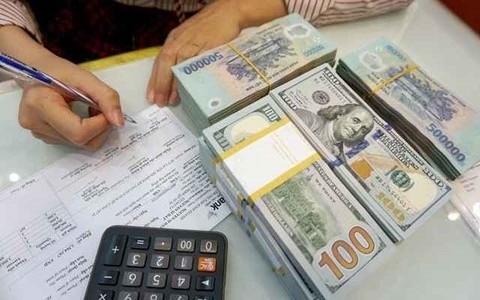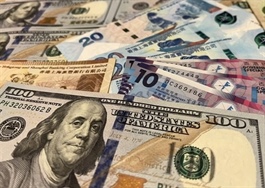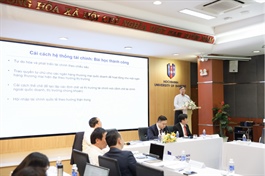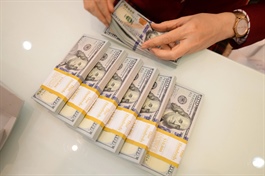Zero per cent dollar-denominated deposit interest rate needs to stabilise forex market
Zero per cent dollar-denominated deposit interest rate needs to stabilise forex market
The State Bank of Vietnam (SBV) should keep the US dollar-denominated deposit interest rate at zero per cent as currently, experts said. There is no need to intervene in the foreign exchange market, as it is stable.

A bank teller counts the dollar at a transaction office in Hà Nội. In the near future, the central bank will have a thorough assessment report on the implementation of the zero per cent dollar-denominated deposit interest rate policy. — Photo cafef.vn |
At a SBV’s recent meeting on the zero per cent dollar-denominated deposit interest rate policy, SBV Deputy Governor Phạm Thanh Hà said the SBV will have a thorough assessment report on the implementation of the policy.
According to Hà, the SBV applied a dollar-denominated deposit interest rate cap of 1 per cent per year for organisations in 2010 and 3 per cent per year for individuals in 2011. The caps were gradually adjusted down to zero per cent from the end of 2015.
According to Hà, the application of the policy is one of the synchronous solutions that the SBV has implemented to stabilise the foreign exchange market, anchor exchange rate expectations and enhance the value of the Vietnamese đồng.
Thanks to the policy, the foreign exchange rate and foreign exchange market are stable. The dollarisation in the economy also decreased sharply, with foreign currency deposits per total means of payment decreasing from 11.06 per cent in 2014 to about 6.05 per cent as of June 2024, Hà said.
At the meeting, experts welcomed the policy, saying that it has contributed to stabilising the exchange rate and foreign exchange market, reducing the dollarisation in the economy, increasing the nation’s foreign exchange reserves and increasing the remittance flows as well as foreign indirect investment and foreign direct investment capital flows.
Expert Lê Xuân Nghĩa said that since the policy’s implementation, the SBV has had a clear plan and roadmap to gradually lower the dollar-denominated deposit interest rates to zero per cent. He recommended that the SBV continue to maintain and carry out a comprehensive assessment of this policy.
In addition, the SBV should continue to research implementing measures to reduce the dollarisation in the economy, which means reducing the attractiveness of holding dollars in the future.
Sharing the same opinion in favour of keeping the policy unchanged, economist Nguyễn Xuân Thành stated three reasons.
Firstly, Thành said that in the short term, if the policy changes, the market will perceive it as a temporary solution, which will have a negative impact.
Secondly, in the medium term, though the US Federal Reserve (Fed)'s monetary policy is currently keeping the dollar interest rates high at above 5 per cent, the Fed in the medium term is determined to control the rate at about 2 per cent. Therefore, in the medium term, the interbank dollar interest rate in the US market will be around 2.25-2.3 per cent, which can help Việt Nam maintain the medium-term dollar-denominated deposit interest rate at 0 per cent.
Finally, in the long term, the policy helps Việt Nam continue to carry out the target of shifting from mobilising and lending the dollar to buying and selling the dollar, which will help enhance the value of the đồng.
Expert Trần Thọ Đạt said unless the foreign exchange market experiences major fluctuations, it is necessary to adjust the policy. Meanwhile, Đạt assessed that the market is currently very stable and there is currently no need to intervene.
























